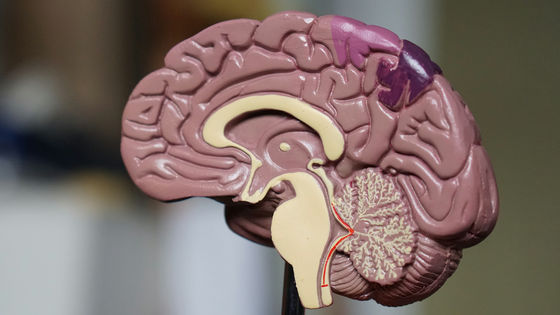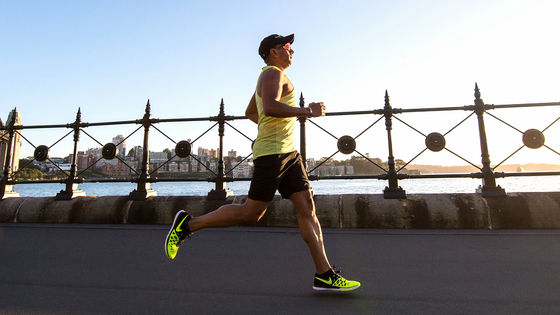Why does the brain need exercise?

By
Exercise is said to improve memory and may improve Alzheimer's disease . David A. Leiken, Professor of Biological Sciences at the University of Southern California, examines the relationship between movement and the brain and how changes in movement in human evolution have affected the brain Is summarized.
Why Your Brain Needs Exercise-Scientific American
https://www.scientificamerican.com/article/why-your-brain-needs-exercise/
◆ Effects of exercise on the brain
For decades it was believed that when humans became adults, the brain stopped producing neurons and began to lose them. However, Salk Institute researchers of the 1990s, 'when the mouse is run, the mouse hippocampus is a new neurons are generated' that the study results were announced. Since then, studies have shown that as age increases exercise can have a positive effect on the human brain, and that exercise can reduce the risk of neurodegenerative diseases such as Alzheimer's disease. Was.
Research at the Salk Institute also found that mouse movement-induced neuron generation could be linked to the production of a protein called brain-derived neurotrophic factor (BDNF). In addition, exercise-induced neurogenesis has been demonstrated to be associated with improved memory performance in mice.

By
An experiment conducted by Kirk Ericsson and Arthur Kramer at the University of Illinois showed that aged 60 to 79 years old aerobic exercise increased BDNF and hippocampal territory, improved memory It became clear. A study of more than 7,000 older adults in the UK in 2019 also showed that those who spent more time on moderate to intense exercise had larger hippocampal volumes.
According to Raiklen, it is not clear how the effects of exercise on the brain are related to neurogenesis and increased connections between existing neurons. However, combining the results of previous studies, it is clear that exercise is beneficial for the hippocampus and cognitive function of the brain, says Leiken. Increased brain area due to exercise has been linked to cognitive enhancement, including planning, decision making, and multitasking. Researchers believe that increasing the connections between existing neurons, rather than creating new ones, is responsible for the beneficial effects of exercise on brain regions.

By
◆ Evolution of human and brain
Humanity evolved into bipedal walking about 6 to 7 million years ago. It is said that the brain was able to maintain posture balance by adjusting information such as how to move the body and the activity of muscles throughout the body in order to learn bipedal posture. It is believed that the evolution of the brain associated with the evolution to bipedalism has resulted in higher brain cognition than ancestral brains that have been quadrupedal.
The ancestors of humanity mainly ate plants, but about 2 million years ago, the change to a cold climate reduced habitat, and humans not only eat plants but also hunt animals and eat. Was. Hunting and gathering have supported human self-sufficiency for about two million years, until agriculture and livestock began about 10,000 years ago. Hunters and gatherers need to know where they are and explore their surroundings. Such spatial awareness relies on the hippocampus. In addition, you need to use your vision and hearing to find food. In addition, you must remember where you previously hunted or collected, and what food was available and when.

By
The human brain has made decisions using both short-term and long-term memory to plan hunting and gathering exploration routes. This is a cognitive task supported by the hippocampus and prefrontal cortex, etc. Also, since hunter-gatherers often forage in groups, not only memory and spatial awareness but also human-to-human conversations may have occurred at the same time. These multitasking processes are mainly controlled by the prefrontal cortex.
In addition, in the case of hunting, it is thought that they performed memory, spatial recognition, and conversation while running. Multitasking during aerobic exercise is more difficult and requires faster information processing. From an evolutionary perspective, it is believed that the brain has evolved to maximize the chances of finding food and address issues that occur during and after foraging.

By pennz
◆ What is exercise to train your brain?
Two million years ago, you had to hunt and collect with aerobic exercise to survive. But in modern society, you don't need to do cardio to find food. Raiklen speculates that age-related brain decline and consequent cognitive decline may be related to the habits of modern people not exercising.
According to Raiklen, 'just exercising may not be enough to control brain decline.' People who do cardio on a regular basis often go to the gym and use exercise machines. A machine like a gym has little aspect of environmental change. Human ancestors have evolved in an unpredictable world, so if you can exercise such as memory and recognition in harsh environments like ancestors, exercise may improve neurodegenerative diseases such as Alzheimer's disease There is, says Leiken.

By jacoblund
Kay Anderson Hanley of Union University conducted a study of brain cognitive and motor changes in people with mild cognitive impairment, a condition associated with an increased risk of Alzheimer's disease. Hanley showed that having subjects play video games and exercising at the same time significantly increased BDNF over exercising alone. These findings further strengthen the idea that BDNF is produced by exercise in the human brain, says Leiklen.
Mr. Leikulen says, `` Sporting that requires a combination of cognitive tasks and aerobic tasks may be a way to activate the brain, '' said Cross Country as an example of sports with environmental changes Are listed. In addition, US Department of Health guidelines recommend that you exercise at least 150 minutes / week at moderate intensity or at least 75 minutes / week at high intensity. Leikuren says that exercising according to the guidelines may also improve brain health.
Related Posts:
in Science, Posted by darkhorse_log







